Management Reflection: Learning and Development Analysis
VerifiedAdded on 2023/01/07
|6
|1337
|2
Homework Assignment
AI Summary
This assignment is a reflection on a student's learning experiences in a management course. The student discusses their understanding of management principles, including planning, organizing, leading, and controlling, as well as traditional and contemporary management approaches. The reflection analyzes feedback received on a written paper, identifying strengths in understanding management roles and theories, and weaknesses in areas such as business analysis tools. The student proposes ideas for development, including note-taking, attending webinars, and group discussions to improve knowledge and application of management concepts. The reflection references various academic sources to support the analysis and conclusions drawn about the learning process and areas for future improvement in the field of management.
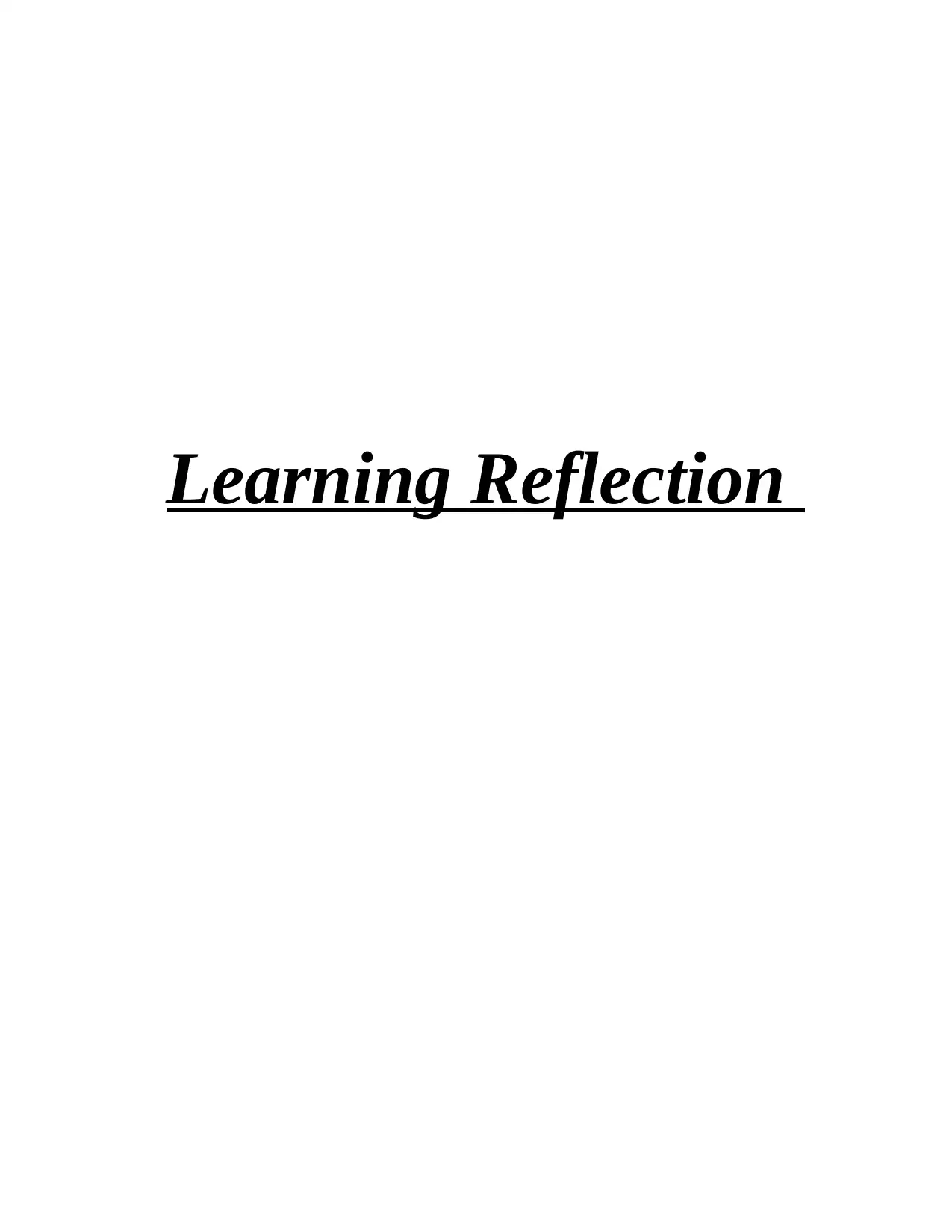
Learning Reflection
Paraphrase This Document
Need a fresh take? Get an instant paraphrase of this document with our AI Paraphraser
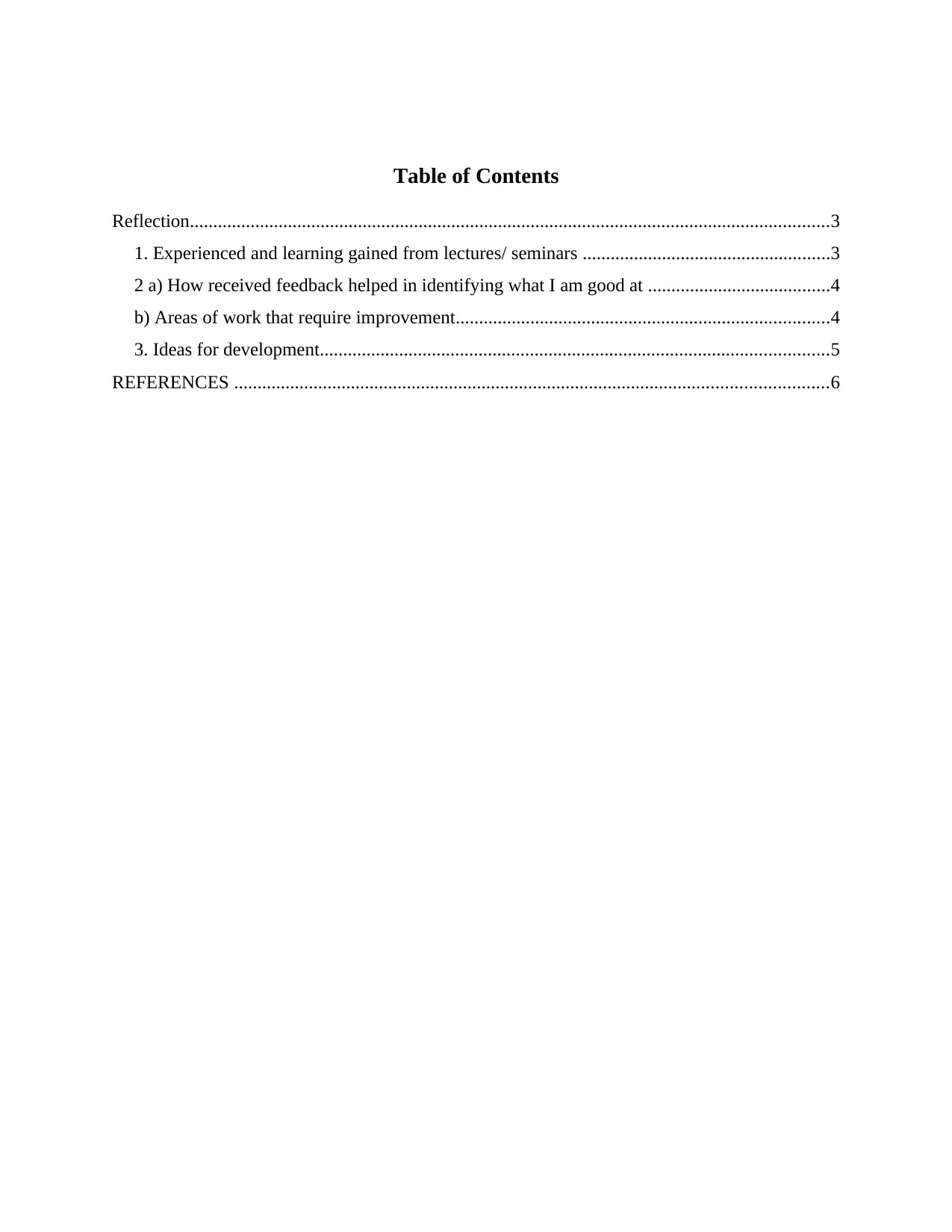
Table of Contents
Reflection.........................................................................................................................................3
1. Experienced and learning gained from lectures/ seminars .....................................................3
2 a) How received feedback helped in identifying what I am good at .......................................4
b) Areas of work that require improvement................................................................................4
3. Ideas for development.............................................................................................................5
REFERENCES ...............................................................................................................................6
Reflection.........................................................................................................................................3
1. Experienced and learning gained from lectures/ seminars .....................................................3
2 a) How received feedback helped in identifying what I am good at .......................................4
b) Areas of work that require improvement................................................................................4
3. Ideas for development.............................................................................................................5
REFERENCES ...............................................................................................................................6
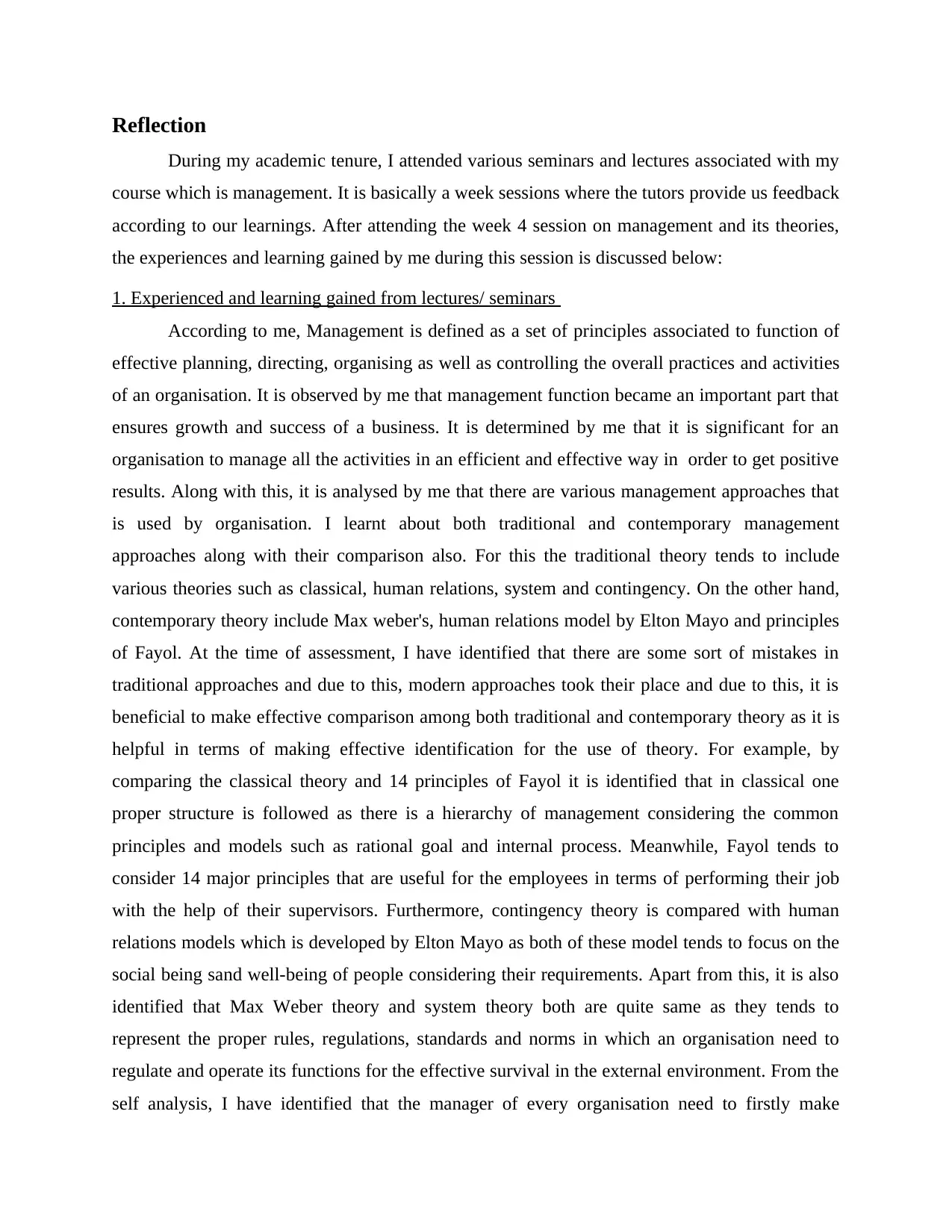
Reflection
During my academic tenure, I attended various seminars and lectures associated with my
course which is management. It is basically a week sessions where the tutors provide us feedback
according to our learnings. After attending the week 4 session on management and its theories,
the experiences and learning gained by me during this session is discussed below:
1. Experienced and learning gained from lectures/ seminars
According to me, Management is defined as a set of principles associated to function of
effective planning, directing, organising as well as controlling the overall practices and activities
of an organisation. It is observed by me that management function became an important part that
ensures growth and success of a business. It is determined by me that it is significant for an
organisation to manage all the activities in an efficient and effective way in order to get positive
results. Along with this, it is analysed by me that there are various management approaches that
is used by organisation. I learnt about both traditional and contemporary management
approaches along with their comparison also. For this the traditional theory tends to include
various theories such as classical, human relations, system and contingency. On the other hand,
contemporary theory include Max weber's, human relations model by Elton Mayo and principles
of Fayol. At the time of assessment, I have identified that there are some sort of mistakes in
traditional approaches and due to this, modern approaches took their place and due to this, it is
beneficial to make effective comparison among both traditional and contemporary theory as it is
helpful in terms of making effective identification for the use of theory. For example, by
comparing the classical theory and 14 principles of Fayol it is identified that in classical one
proper structure is followed as there is a hierarchy of management considering the common
principles and models such as rational goal and internal process. Meanwhile, Fayol tends to
consider 14 major principles that are useful for the employees in terms of performing their job
with the help of their supervisors. Furthermore, contingency theory is compared with human
relations models which is developed by Elton Mayo as both of these model tends to focus on the
social being sand well-being of people considering their requirements. Apart from this, it is also
identified that Max Weber theory and system theory both are quite same as they tends to
represent the proper rules, regulations, standards and norms in which an organisation need to
regulate and operate its functions for the effective survival in the external environment. From the
self analysis, I have identified that the manager of every organisation need to firstly make
During my academic tenure, I attended various seminars and lectures associated with my
course which is management. It is basically a week sessions where the tutors provide us feedback
according to our learnings. After attending the week 4 session on management and its theories,
the experiences and learning gained by me during this session is discussed below:
1. Experienced and learning gained from lectures/ seminars
According to me, Management is defined as a set of principles associated to function of
effective planning, directing, organising as well as controlling the overall practices and activities
of an organisation. It is observed by me that management function became an important part that
ensures growth and success of a business. It is determined by me that it is significant for an
organisation to manage all the activities in an efficient and effective way in order to get positive
results. Along with this, it is analysed by me that there are various management approaches that
is used by organisation. I learnt about both traditional and contemporary management
approaches along with their comparison also. For this the traditional theory tends to include
various theories such as classical, human relations, system and contingency. On the other hand,
contemporary theory include Max weber's, human relations model by Elton Mayo and principles
of Fayol. At the time of assessment, I have identified that there are some sort of mistakes in
traditional approaches and due to this, modern approaches took their place and due to this, it is
beneficial to make effective comparison among both traditional and contemporary theory as it is
helpful in terms of making effective identification for the use of theory. For example, by
comparing the classical theory and 14 principles of Fayol it is identified that in classical one
proper structure is followed as there is a hierarchy of management considering the common
principles and models such as rational goal and internal process. Meanwhile, Fayol tends to
consider 14 major principles that are useful for the employees in terms of performing their job
with the help of their supervisors. Furthermore, contingency theory is compared with human
relations models which is developed by Elton Mayo as both of these model tends to focus on the
social being sand well-being of people considering their requirements. Apart from this, it is also
identified that Max Weber theory and system theory both are quite same as they tends to
represent the proper rules, regulations, standards and norms in which an organisation need to
regulate and operate its functions for the effective survival in the external environment. From the
self analysis, I have identified that the manager of every organisation need to firstly make
⊘ This is a preview!⊘
Do you want full access?
Subscribe today to unlock all pages.

Trusted by 1+ million students worldwide
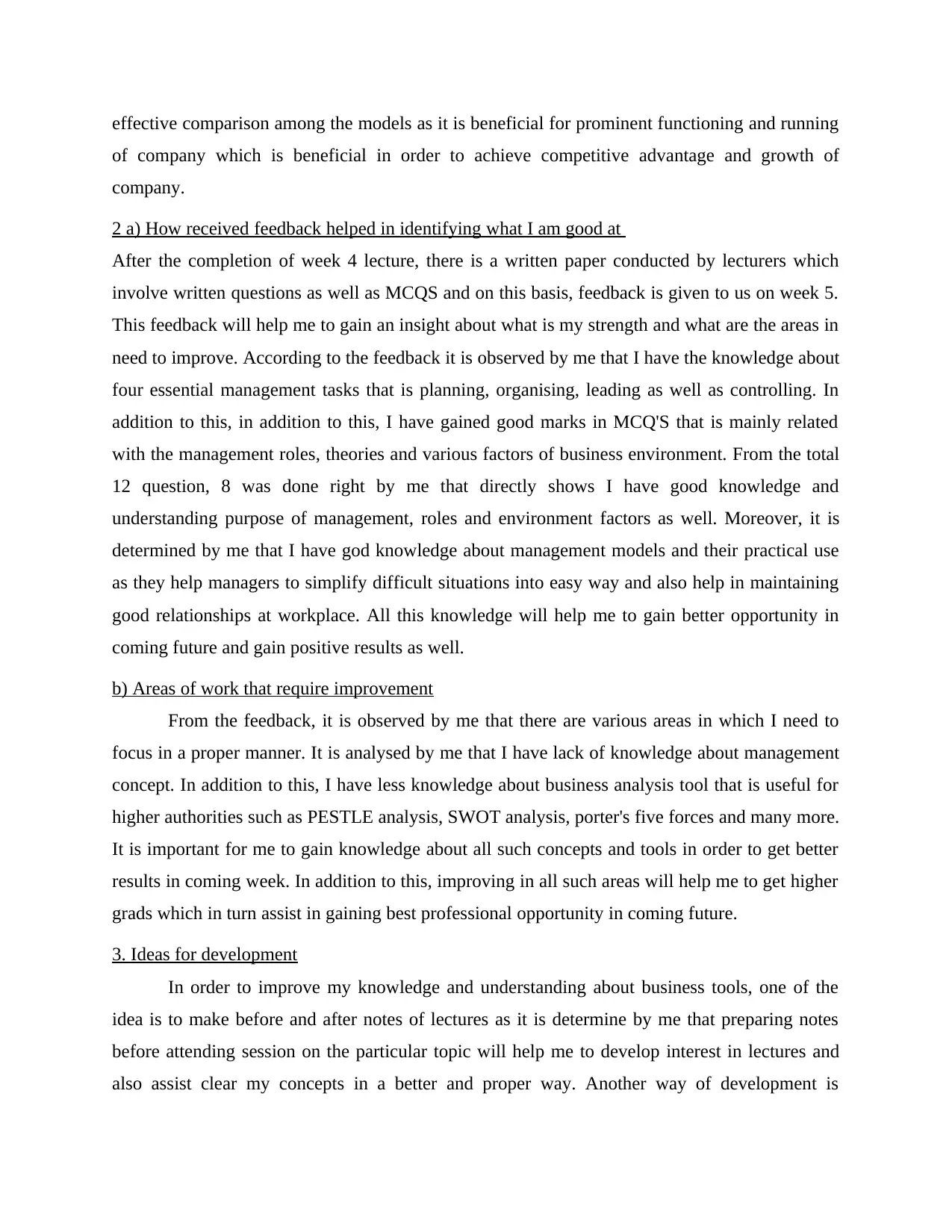
effective comparison among the models as it is beneficial for prominent functioning and running
of company which is beneficial in order to achieve competitive advantage and growth of
company.
2 a) How received feedback helped in identifying what I am good at
After the completion of week 4 lecture, there is a written paper conducted by lecturers which
involve written questions as well as MCQS and on this basis, feedback is given to us on week 5.
This feedback will help me to gain an insight about what is my strength and what are the areas in
need to improve. According to the feedback it is observed by me that I have the knowledge about
four essential management tasks that is planning, organising, leading as well as controlling. In
addition to this, in addition to this, I have gained good marks in MCQ'S that is mainly related
with the management roles, theories and various factors of business environment. From the total
12 question, 8 was done right by me that directly shows I have good knowledge and
understanding purpose of management, roles and environment factors as well. Moreover, it is
determined by me that I have god knowledge about management models and their practical use
as they help managers to simplify difficult situations into easy way and also help in maintaining
good relationships at workplace. All this knowledge will help me to gain better opportunity in
coming future and gain positive results as well.
b) Areas of work that require improvement
From the feedback, it is observed by me that there are various areas in which I need to
focus in a proper manner. It is analysed by me that I have lack of knowledge about management
concept. In addition to this, I have less knowledge about business analysis tool that is useful for
higher authorities such as PESTLE analysis, SWOT analysis, porter's five forces and many more.
It is important for me to gain knowledge about all such concepts and tools in order to get better
results in coming week. In addition to this, improving in all such areas will help me to get higher
grads which in turn assist in gaining best professional opportunity in coming future.
3. Ideas for development
In order to improve my knowledge and understanding about business tools, one of the
idea is to make before and after notes of lectures as it is determine by me that preparing notes
before attending session on the particular topic will help me to develop interest in lectures and
also assist clear my concepts in a better and proper way. Another way of development is
of company which is beneficial in order to achieve competitive advantage and growth of
company.
2 a) How received feedback helped in identifying what I am good at
After the completion of week 4 lecture, there is a written paper conducted by lecturers which
involve written questions as well as MCQS and on this basis, feedback is given to us on week 5.
This feedback will help me to gain an insight about what is my strength and what are the areas in
need to improve. According to the feedback it is observed by me that I have the knowledge about
four essential management tasks that is planning, organising, leading as well as controlling. In
addition to this, in addition to this, I have gained good marks in MCQ'S that is mainly related
with the management roles, theories and various factors of business environment. From the total
12 question, 8 was done right by me that directly shows I have good knowledge and
understanding purpose of management, roles and environment factors as well. Moreover, it is
determined by me that I have god knowledge about management models and their practical use
as they help managers to simplify difficult situations into easy way and also help in maintaining
good relationships at workplace. All this knowledge will help me to gain better opportunity in
coming future and gain positive results as well.
b) Areas of work that require improvement
From the feedback, it is observed by me that there are various areas in which I need to
focus in a proper manner. It is analysed by me that I have lack of knowledge about management
concept. In addition to this, I have less knowledge about business analysis tool that is useful for
higher authorities such as PESTLE analysis, SWOT analysis, porter's five forces and many more.
It is important for me to gain knowledge about all such concepts and tools in order to get better
results in coming week. In addition to this, improving in all such areas will help me to get higher
grads which in turn assist in gaining best professional opportunity in coming future.
3. Ideas for development
In order to improve my knowledge and understanding about business tools, one of the
idea is to make before and after notes of lectures as it is determine by me that preparing notes
before attending session on the particular topic will help me to develop interest in lectures and
also assist clear my concepts in a better and proper way. Another way of development is
Paraphrase This Document
Need a fresh take? Get an instant paraphrase of this document with our AI Paraphraser
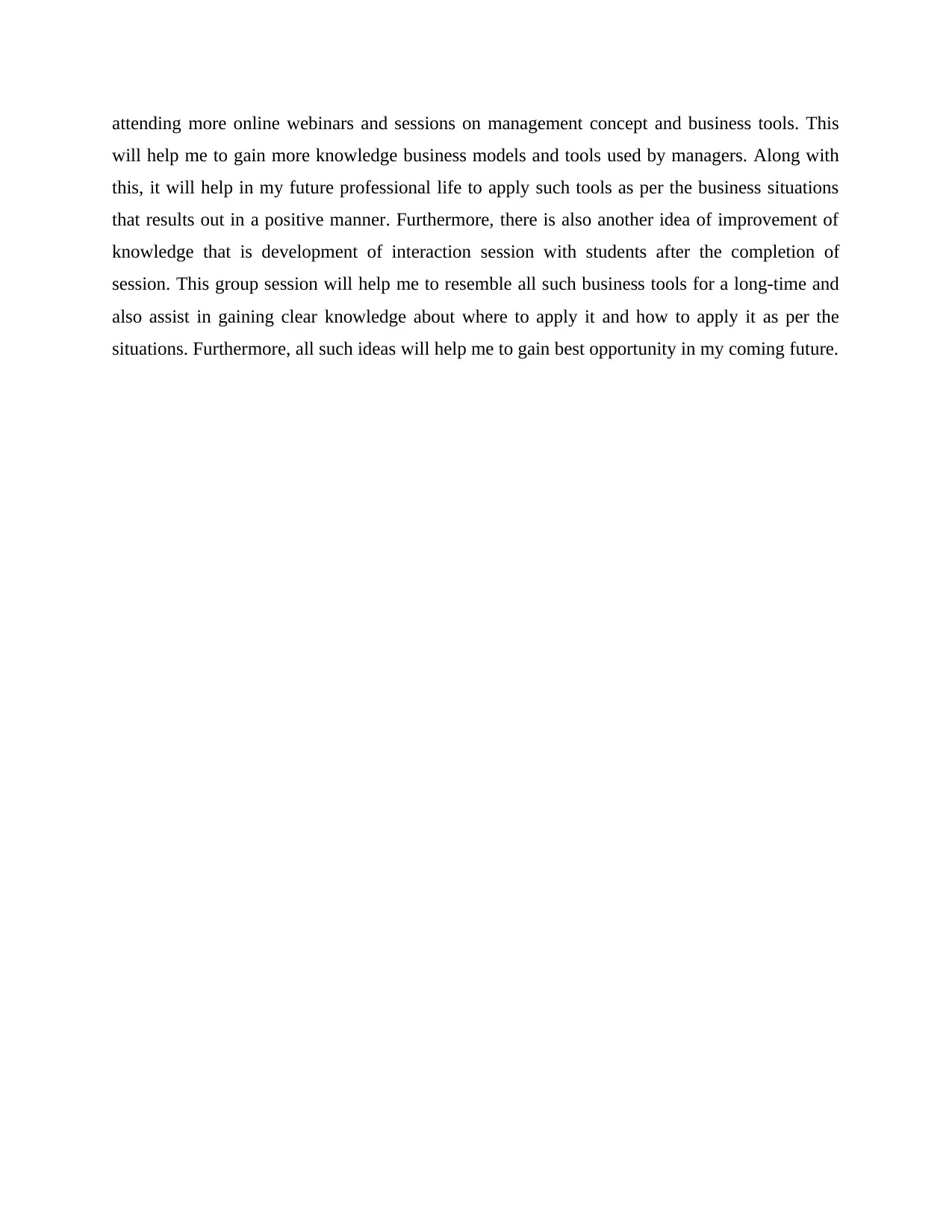
attending more online webinars and sessions on management concept and business tools. This
will help me to gain more knowledge business models and tools used by managers. Along with
this, it will help in my future professional life to apply such tools as per the business situations
that results out in a positive manner. Furthermore, there is also another idea of improvement of
knowledge that is development of interaction session with students after the completion of
session. This group session will help me to resemble all such business tools for a long-time and
also assist in gaining clear knowledge about where to apply it and how to apply it as per the
situations. Furthermore, all such ideas will help me to gain best opportunity in my coming future.
will help me to gain more knowledge business models and tools used by managers. Along with
this, it will help in my future professional life to apply such tools as per the business situations
that results out in a positive manner. Furthermore, there is also another idea of improvement of
knowledge that is development of interaction session with students after the completion of
session. This group session will help me to resemble all such business tools for a long-time and
also assist in gaining clear knowledge about where to apply it and how to apply it as per the
situations. Furthermore, all such ideas will help me to gain best opportunity in my coming future.
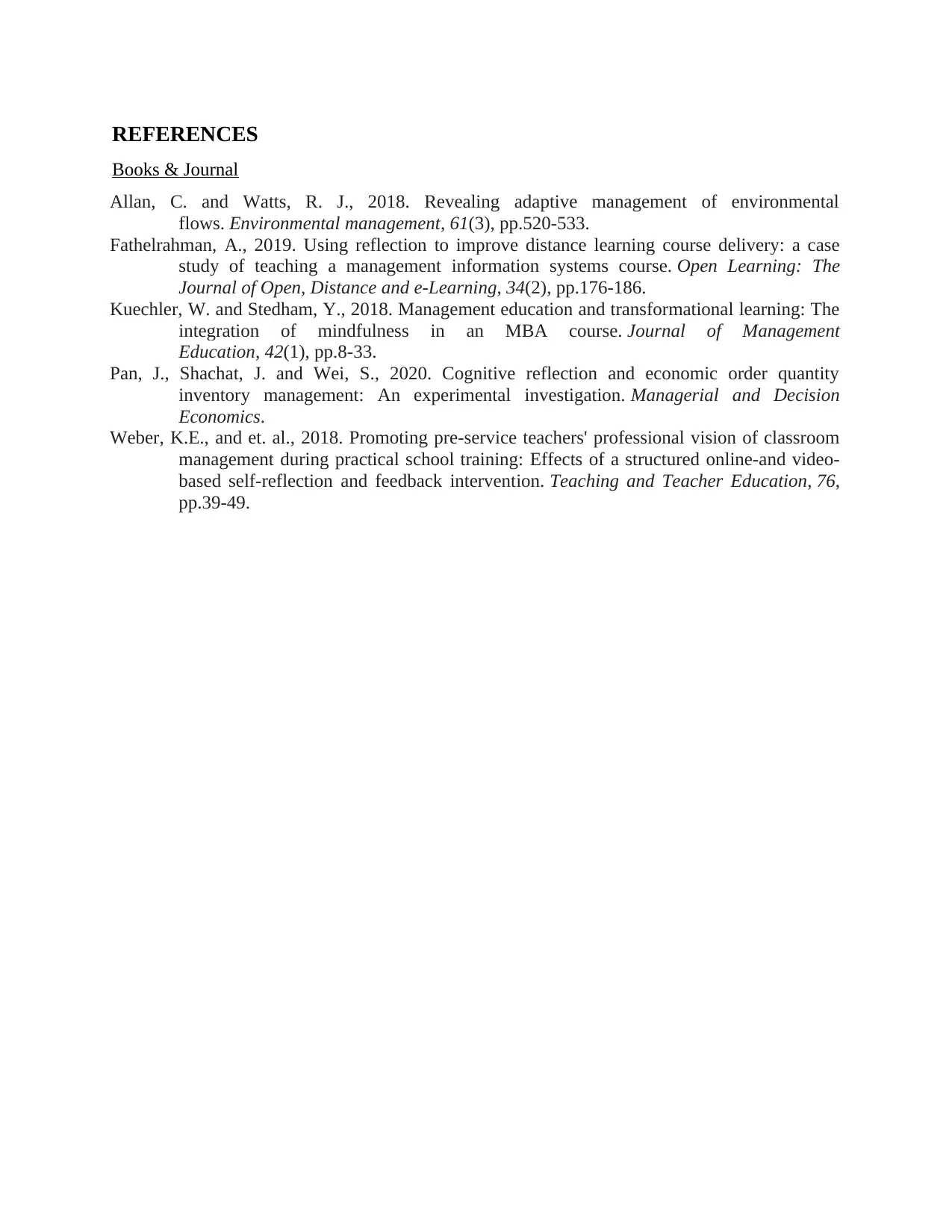
REFERENCES
Books & Journal
Allan, C. and Watts, R. J., 2018. Revealing adaptive management of environmental
flows. Environmental management, 61(3), pp.520-533.
Fathelrahman, A., 2019. Using reflection to improve distance learning course delivery: a case
study of teaching a management information systems course. Open Learning: The
Journal of Open, Distance and e-Learning, 34(2), pp.176-186.
Kuechler, W. and Stedham, Y., 2018. Management education and transformational learning: The
integration of mindfulness in an MBA course. Journal of Management
Education, 42(1), pp.8-33.
Pan, J., Shachat, J. and Wei, S., 2020. Cognitive reflection and economic order quantity
inventory management: An experimental investigation. Managerial and Decision
Economics.
Weber, K.E., and et. al., 2018. Promoting pre-service teachers' professional vision of classroom
management during practical school training: Effects of a structured online-and video-
based self-reflection and feedback intervention. Teaching and Teacher Education, 76,
pp.39-49.
Books & Journal
Allan, C. and Watts, R. J., 2018. Revealing adaptive management of environmental
flows. Environmental management, 61(3), pp.520-533.
Fathelrahman, A., 2019. Using reflection to improve distance learning course delivery: a case
study of teaching a management information systems course. Open Learning: The
Journal of Open, Distance and e-Learning, 34(2), pp.176-186.
Kuechler, W. and Stedham, Y., 2018. Management education and transformational learning: The
integration of mindfulness in an MBA course. Journal of Management
Education, 42(1), pp.8-33.
Pan, J., Shachat, J. and Wei, S., 2020. Cognitive reflection and economic order quantity
inventory management: An experimental investigation. Managerial and Decision
Economics.
Weber, K.E., and et. al., 2018. Promoting pre-service teachers' professional vision of classroom
management during practical school training: Effects of a structured online-and video-
based self-reflection and feedback intervention. Teaching and Teacher Education, 76,
pp.39-49.
⊘ This is a preview!⊘
Do you want full access?
Subscribe today to unlock all pages.

Trusted by 1+ million students worldwide
1 out of 6
Related Documents
Your All-in-One AI-Powered Toolkit for Academic Success.
+13062052269
info@desklib.com
Available 24*7 on WhatsApp / Email
![[object Object]](/_next/static/media/star-bottom.7253800d.svg)
Unlock your academic potential
Copyright © 2020–2026 A2Z Services. All Rights Reserved. Developed and managed by ZUCOL.





